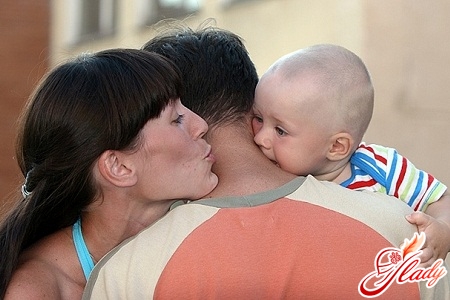 That there is a huge one living next to usthe number of children with Down syndrome is known to all. However, everyone tries to pretend that the problems do not exist and prefers not to notice such children. Of course, you can live your whole life hiding your head in the sand from this problem, like an ostrich. However, sometimes, to great regret, the problem itself overtakes parents and they give birth to a child with Down syndrome. Panic, despair, depression. But no matter how painful and bad it is for parents, life goes on. And their baby, even if slightly different from other children, desperately needs parental affection, care and love. In order to provide their child with the most fulfilling existence in society, parents should have complete information about such a disease as Down syndrome.
That there is a huge one living next to usthe number of children with Down syndrome is known to all. However, everyone tries to pretend that the problems do not exist and prefers not to notice such children. Of course, you can live your whole life hiding your head in the sand from this problem, like an ostrich. However, sometimes, to great regret, the problem itself overtakes parents and they give birth to a child with Down syndrome. Panic, despair, depression. But no matter how painful and bad it is for parents, life goes on. And their baby, even if slightly different from other children, desperately needs parental affection, care and love. In order to provide their child with the most fulfilling existence in society, parents should have complete information about such a disease as Down syndrome.
What is Down syndrome?
The very word "syndrome" implies a set ofa number of features of the body or health condition. The name "Down" syndrome received from the surname of the doctor who first described this syndrome in medical literature. This happened in 1966. And only in 1959, the French professor Lejeune established that Down syndrome occurs if a certain genetic failure occurs. As is known, the human body consists of cells, each of which contains a certain number of chromosomes. Chromosomes carry a certain coded information about all the traits that a person inherited from parents. A child suffering from Down syndrome has a third, extra chromosome in the 21st pair of chromosomes. And as a result, the child is born not with 46 chromosomes, like everyone else, but with 47. Such a disorder occurs on average in one child out of 700 newborns. And, despite the fact that this phenomenon occurs quite often, scientists have not yet been able to establish the exact cause of the genetic changes. There is a common misconception among the population that children with Down syndrome are born only in socially disadvantaged families. However, in reality, this is not true at all. Cases of the birth of such children are equally common in families with the most diverse social status, financial capabilities, and parental education. And there are many such examples: surely, everyone knows the singer and TV presenter Lolita Milyavskaya, Down syndrome also affected her daughter. However, thanks to the efforts of the mother, the child is developing successfully. The only dependence that can be traced quite accurately is the mother's age. The older the pregnant woman, the higher her risk of giving birth to a child with Down syndrome. Unfortunately, it is impossible to prevent the occurrence of Down syndrome, as well as to cure it later. However, modern scientists, thanks to a huge number of various studies, have quite extensive information about the principle of functioning of all pairs of chromosomes, including the 21st pair. Thanks to all these studies, doctors have a fairly good understanding of the characteristics of Down syndrome, and, accordingly, can provide all necessary medical care in full, as well as implement the latest methods of social pedagogy, facilitating the adaptation of such people in society.
Features of children with Down syndrome?
As a rule, the presence of a newborn childis detected immediately after birth. First of all, the medical staff notices the typical facial features and body structure of children with Down syndrome. Such babies have slightly raised corners of the eyes, and the face itself seems flattened. The oral cavity of a child with Down syndrome is slightly smaller than that of healthy babies, but the tongue itself is larger. Looking ahead, we can say that it is precisely because of these physiological features that children with Down syndrome often have a habit of constantly sticking out their tongue. But this habit is not so difficult to cope with if you want. The palms of such children are very wide, the fingers are short, and the little fingers are significantly bent inward. Newborns have muscle flaccidity (hypotonia), expressed to a mild degree. This hypotonia should not be a cause for concern for parents - it will disappear on its own as the child grows. The height and weight of a baby with Down syndrome are usually slightly less than that of healthy babies. If doctors notice these symptoms in the baby, he will definitely undergo a series of special genetic tests that will allow them to accurately determine the presence or absence of Down syndrome in the child.
How does the superfluous chromosome manifest itself?
Of course, the presence of an extra chromosome does notmay not affect the child's health and development of thinking. However, these differences from healthy children can be very different. In one child with Down syndrome, they will be very pronounced, while in another, they will be so insignificant that at first glance it will not be possible to even guess about the child's illness. Children suffering from Down syndrome also have health peculiarities. For example, such children are more susceptible than others to such diseases as:
- Congenital heart diseases. And most of them are quite serious and require surgical intervention.
- Problems with the auditory or visual apparatus.
- Diseases of the thyroid gland.
- Frequent acute respiratory infections.
As already mentioned, this pathology alsoalways affects the child's intellectual development. The child's intellectual development disorders can be very different. However, most often children with Down syndrome are capable of learning if they are given such an opportunity. However, it goes without saying that such children need a strictly individual approach to learning. The educational program for a child with Down syndrome should be constantly adjusted, depending on the child's academic performance and needs.
How to reconcile with the birth of such a baby?
Of course, upon learning that the child was born withsuch a pathology, all parents without exception experience shock and refuse to believe until the very end that the diagnosis is correct. Parents are scared and confused, they do not know how to live on and how to behave with such an unusual baby. In no case should you be scared and ashamed of your feelings - such a defensive reaction is characteristic of the psyche of any person: to run away from reality, to hide from problems. Parents of such babies are haunted by a variety of fears - someone is afraid that the birth of a child with Down syndrome in their family will lead to their rejection among friends and acquaintances. And someone is afraid that their social status will change because of the child, someone experiences a desperate sense of guilt before their child, mistakenly believing that Down syndrome arose because of some of their wrong actions. However, no matter how difficult and difficult it is, parents will still have to return to their usual way of life - do everyday things, work, renew connections with people. Of course, it takes time to fully come to your senses and take control of the situation. Often a lot of time – several months, maybe even years. However, as the experience of a huge number of families raising children with Down syndrome shows, sooner or later life gets back on track.
Hello, baby!
Many parents of children suffering from the syndromeDown, remembering the first days and weeks after the birth of the baby, said that they had fear and reluctance to approach the newborn. However, this feeling passes very quickly and, stepping over their fears and doubts, parents take their baby in their arms, examine him, begin to care for him and very quickly understand that their unusual baby also needs affection, care and love, like any other child.
How do I report the characteristics of the child to others?
The parents of a child with Down syndrome are faced withAnother rather difficult task is to tell the people around you about the birth of a sick child. Very often, the family decides to keep this fact a secret. However, according to family psychologists, this is not the best decision. Sooner or later, but the people around you will notice that the child looks a little different from all the other children, because Down syndrome is recognizable, photos of sick children can be seen quite often. Therefore, in order to prevent unwanted questions and not spoil the relationship, it is worth starting a conversation about it first. Of course, this conversation will not be easy, but it will be a decisive step towards returning the family to normal life. After all, they will not be able to hide their child for the rest of their lives, no matter how hard they try. Remember that your friends and family are also uneasy: after all, they also do not know how to behave, are afraid to offer their help, so that you do not get offended and do not think that they are interfering in other people's business.
What can I do to help a baby with Down syndrome?
Of course, parents of children with Down syndromeare very worried about what fate awaits the little person. Strictly speaking, it is on them that the fact depends on how successfully children with Down syndrome, having become adults, will be able to adapt to life. Parents can help their child:
No matter how hard it is for you now, and no matter whatno matter how ridiculous any words of consolation may seem to you, remember that this difficult time for you will fly by very quickly. And your life will again acquire meaning and new colors! We recommend reading:









